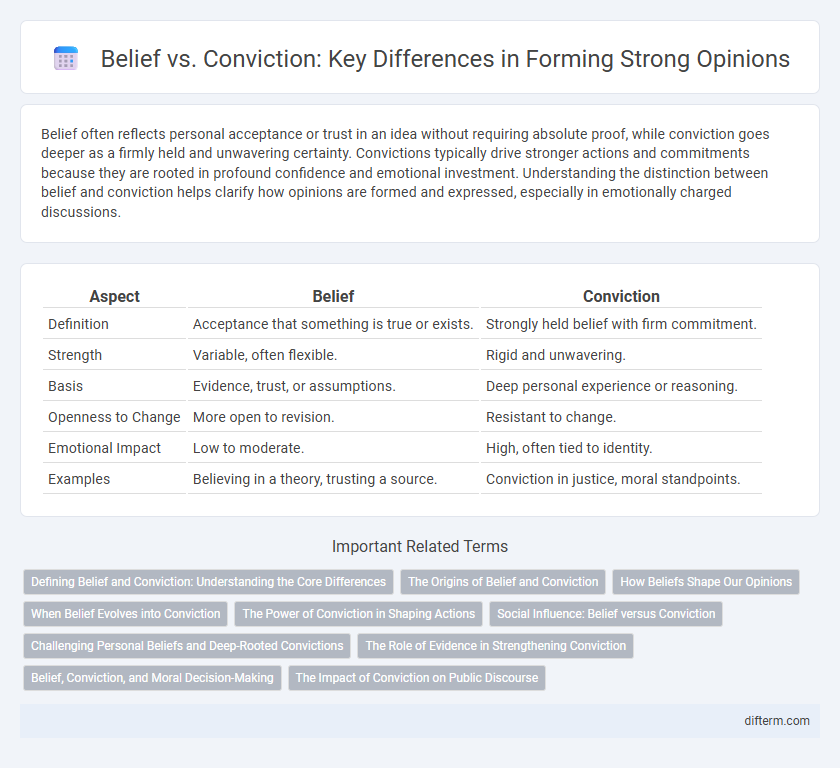Belief often reflects personal acceptance or trust in an idea without requiring absolute proof, while conviction goes deeper as a firmly held and unwavering certainty. Convictions typically drive stronger actions and commitments because they are rooted in profound confidence and emotional investment. Understanding the distinction between belief and conviction helps clarify how opinions are formed and expressed, especially in emotionally charged discussions.
Table of Comparison
| Aspect | Belief | Conviction |
|---|---|---|
| Definition | Acceptance that something is true or exists. | Strongly held belief with firm commitment. |
| Strength | Variable, often flexible. | Rigid and unwavering. |
| Basis | Evidence, trust, or assumptions. | Deep personal experience or reasoning. |
| Openness to Change | More open to revision. | Resistant to change. |
| Emotional Impact | Low to moderate. | High, often tied to identity. |
| Examples | Believing in a theory, trusting a source. | Conviction in justice, moral standpoints. |
Defining Belief and Conviction: Understanding the Core Differences
Belief represents a personal acceptance that something is true, often influenced by cultural, social, or emotional factors, whereas conviction embodies a deeply rooted certainty supported by strong evidence or reasoning. Beliefs can be flexible and subject to change over time, while convictions typically demonstrate unwavering commitment and resilience against opposing views. Understanding these core differences highlights how belief informs initial acceptance and conviction drives enduring commitment to principles or ideas.
The Origins of Belief and Conviction
Belief often originates from external influences such as cultural norms, social environment, and early experiences, which shape an individual's initial acceptance of ideas. Conviction, in contrast, develops through personal reflection, critical analysis, and emotional commitment, reinforcing the strength and persistence of one's stance. Understanding the distinct origins highlights how beliefs can evolve into deeply held convictions through cognitive and experiential processes.
How Beliefs Shape Our Opinions
Beliefs act as the foundation for our opinions by filtering information through personal experiences and cultural backgrounds, thereby shaping how we interpret facts and events. Convictions, being stronger and more deeply held, often resist change even when faced with conflicting evidence, solidifying opinions into unwavering stances. Understanding the difference between flexible beliefs and rigid convictions reveals how opinions evolve or persist in social and political contexts.
When Belief Evolves into Conviction
Belief transforms into conviction when repeated experience and critical reflection solidify abstract ideas into unwavering personal truths. This evolution is marked by a deep emotional investment and consistent actions that reinforce the belief's importance in one's identity. Conviction manifests as a powerful motivator, driving persistence and resilience even in the face of opposition.
The Power of Conviction in Shaping Actions
Conviction drives decisive actions by anchoring beliefs in deep personal certainty and unwavering commitment. Unlike fleeting beliefs, conviction motivates persistent efforts and resilience, profoundly influencing goal achievement and leadership effectiveness. This underlying power transforms abstract ideas into tangible outcomes through consistent behavior and dedication.
Social Influence: Belief versus Conviction
Belief often shifts under social influence, adapting to group norms and external opinions, whereas conviction remains steadfast due to deeply held personal values or experiences. Social dynamics can sway beliefs through conformity and persuasion, but convictions resist change, serving as anchors of identity and moral certainty. Understanding this distinction highlights the varying degrees of susceptibility individuals have to societal pressures in shaping their viewpoints.
Challenging Personal Beliefs and Deep-Rooted Convictions
Challenging personal beliefs requires openness to new perspectives that may conflict with existing assumptions, whereas deep-rooted convictions often stem from emotional or cultural foundations resistant to change. Engaging critically with these convictions involves distinguishing between flexible opinions and core values that shape identity. Understanding this difference is crucial for personal growth and meaningful dialogue.
The Role of Evidence in Strengthening Conviction
Conviction solidifies when supported by concrete evidence, distinguishing it from mere belief, which often relies on faith or assumption. Empirical data and verifiable facts provide a foundation that transforms subjective opinions into firm convictions. This evidence-based approach bolsters confidence and resilience in one's stance, making conviction both rational and enduring.
Belief, Conviction, and Moral Decision-Making
Belief shapes moral decision-making by providing a flexible framework that adapts to new information and experiences, enabling individuals to reevaluate their values and actions. Conviction, rooted in deep-seated certainty, often drives unwavering commitment to ethical principles but can limit openness to alternative perspectives. Balancing belief and conviction is essential for nuanced moral judgments that reflect both steadfast values and evolving understanding.
The Impact of Conviction on Public Discourse
Conviction drives unwavering commitment to beliefs, shaping public discourse by fostering passionate debates and influencing societal values. Unlike mere belief, which may waver, conviction galvanizes communities and prompts decisive action, often swaying political and cultural narratives. The intensity of conviction can both unite movements and polarize discussions, highlighting its profound impact on democratic engagement.
belief vs conviction Infographic

 difterm.com
difterm.com